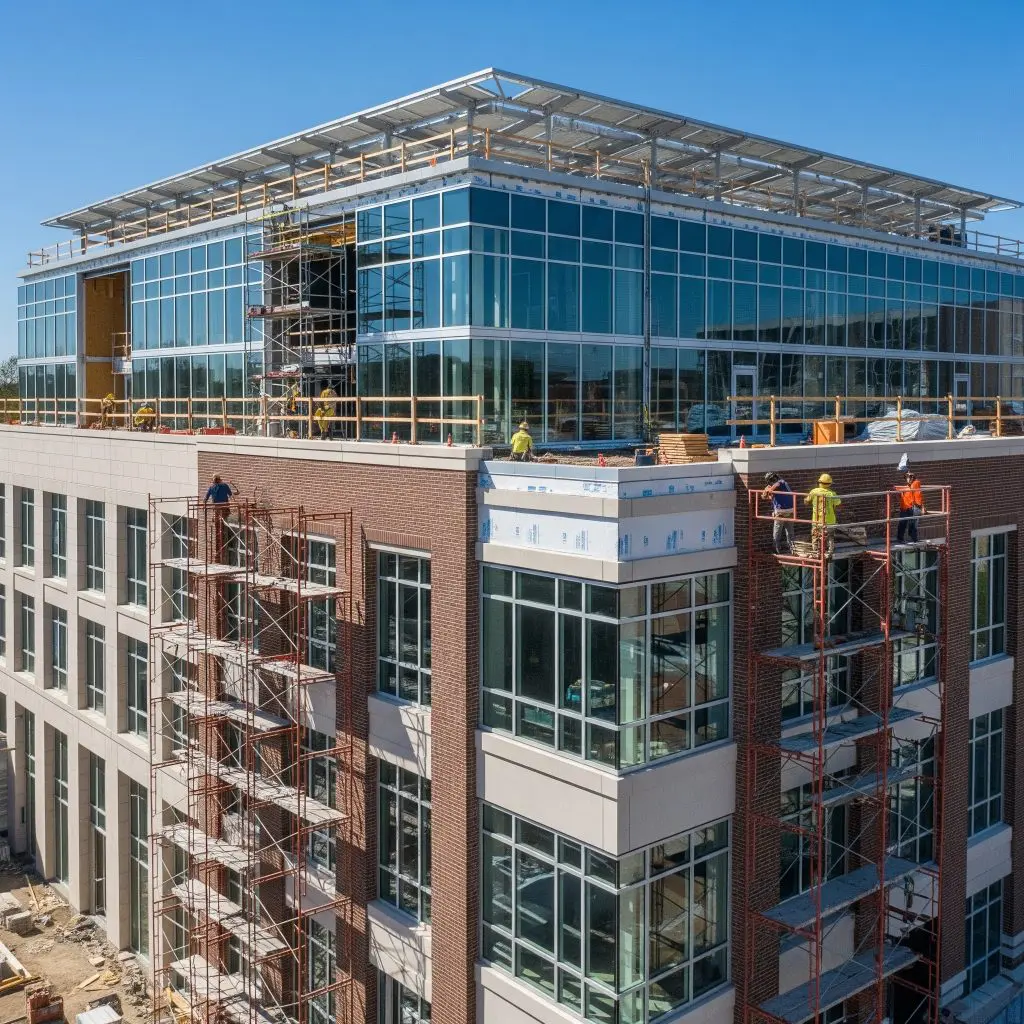How to Get Approved for an SBA 7(a) Loan With Bad Credit: The Complete 2025 Guide for Texas Small Business Owners
Dallas – October 29, 2025: For thousands of small business owners across Texas—from Houston’s bustling commercial corridors and Dallas–Fort Worth’s logistics hubs to Austin’s tech-driven ecosystem and San Antonio’s manufacturing base—access to affordable financing can be the difference between growth and stagnation.
If you have bad credit, securing funding through traditional banks can feel nearly impossible. Declines often happen instantly. Phone calls go unreturned. And automated underwriting models have zero interest in hearing your story.
However, the SBA 7(a) loan program remains one of the most accessible ways for a business owner with challenged credit to secure real capital at bank-rate terms.
This guide explains exactly how to get approved for an SBA 7(a) loan with bad credit, why credit is not the only or most important factor, and how GHC Funding can help you navigate the process with confidence.
- Why SBA 7(a) Loans Are Still Within Reach—Even With Bad Credit
- Current SBA 7(a) Rates (As of Today’s Market Conditions)
- SBA 7(a) Loan Requirements (And Why They’re Friendly for Bad-Credit Borrowers)
- How to Get Approved for an SBA 7(a) Loan With Bad Credit
- 1. Strengthen Your Business Cash Flow Narrative
- 2. Document Your Credit Challenges (Briefly and Professionally)
- 3. Update Your Business Financials
- 4. Show Personal Investment or Collateral Strength (If Applicable)
- 5. Work With a Lender That Specializes in Bad-Credit SBA Approvals
- Why GHC Funding Is the Preferred SBA 7(a) Partner for Texas Business Owners
- SBA 7(a) Loan Approval Tips for Texas Business Owners
- Helpful Texas-Based External Resources
- Q&A: Common Questions About Getting an SBA 7(a) Loan With Bad Credit
- Final Thoughts: SBA 7(a) Financing Is Achievable—Even With Bad Credit
- Call GHC Funding Today
- Get an SBA loan in Texas.
Why SBA 7(a) Loans Are Still Within Reach—Even With Bad Credit
Contrary to popular belief, SBA lenders do not require perfect credit.
In fact, many approved SBA borrowers start with:
- Sub-650 scores
- Past credit challenges
- High utilization
- Limited credit depth
- Thin credit history due to being a newer entrepreneur
The SBA’s guarantee (up to 85%) reduces risk for lenders, allowing them to consider applications that big banks immediately reject.
The key is how you position your file, your business performance, and your ability to repay.
This guide explains exactly how to do that.

Current SBA 7(a) Rates (As of Today’s Market Conditions)
SBA 7(a) loans have variable interest rates tied to the Prime Rate. As of today’s market, a realistic range to expect is:
SBA 7(a) Rates (2025 Market Range)
- Prime + 2.75% to Prime + 4.75%
- Equivalent APR range: approximately 11.5% – 14.5%
What Impacts Your Rate?
- Personal credit profile (lower scores may lead to higher margins)
- Time in business
- Annual revenue
- Industry risk profile
- Available collateral
- Strength of business cash flow
- Global debt service (personal + business repayment ability)
Even with bad credit, if cash flow is strong, SBA lenders can still offer competitive bank-rate terms—far cheaper than online lenders or merchant cash advance (MCA) products.
Are You an SBA Real Estate Loan Expert?

Test your in-depth knowledge on using SBA Loans for owner-occupied commercial Real Estate acquisition. These questions delve into the critical details that can impact your business's growth and financial strategy.
SBA 7(a) Loan Requirements (And Why They’re Friendly for Bad-Credit Borrowers)
Minimum Requirements to Qualify
While lenders vary, these are the core requirements:
- Credit score: Many SBA lenders work with scores as low as 600–620 when the business is strong.
- Time in business: Minimum 2 years preferred, but strong startups may qualify with a solid business plan.
- Cash flow: Must cover projected loan payments with a 1.15–1.25x DSCR.
- Collateral: Not required for loans under $25,000; flexible for larger loans.
- Use of funds: Broad, including working capital, equipment, payroll, refinancing high-interest debt, and business acquisition.
- Down payment: Typically 10% for acquisitions; may be zero for working capital.
Benefits for Challenged Credit Profiles
- Long repayment terms (up to 10 years, and 25 years for real estate)
- Lower monthly payments
- No prepayment penalties on most SBA loans
- Flexible use of proceeds
- Ability to consolidate or refinance expensive short-term debt
- SBA guarantee reduces lender risk—helping bad-credit borrowers get approved
Navigating SBA 7(a) Loans: An Essential Quiz for Small Business Owners

Test your knowledge on the SBA's most popular loan program, designed to fuel business growth and expansion - SBA 7(a) Loans!
How to Get Approved for an SBA 7(a) Loan With Bad Credit
Here is the exact step-by-step playbook business owners in Texas should follow.
1. Strengthen Your Business Cash Flow Narrative
SBA lenders look primarily at business performance, not just personal credit.
If your business can reasonably demonstrate:
- Stable revenue
- Recurring customer demand
- Positive cash flow
- Clear ability to support repayment
… you are already ahead of most applicants, regardless of personal credit score.
For Texas industries like:
- Oil & gas support services (Midland, Odessa)
- Construction firms (Houston, Dallas)
- Restaurants and food trucks (Austin, San Antonio, El Paso)
- Retail and service storefronts (Plano, Frisco, Arlington)
- Manufacturing (Waco, Round Rock)
cash flow strength is the #1 approval factor.
2. Document Your Credit Challenges (Briefly and Professionally)
Lenders don’t need excuses.
They need context.
Explain concisely:
- What happened
- Why it happened
- What you changed
- Why it will not happen again
Common acceptable explanations include:
- One-time medical issues
- Divorce
- Former business partner disputes
- Temporary revenue loss from COVID-era disruptions
- Equipment failures that have since been resolved
- Outdated credit accounts that never updated after payoff
A short, factual explanation is far more effective than avoiding the subject.
3. Update Your Business Financials
Most bad-credit SBA declines happen because the financial package is incomplete or poorly organized.
Prepare clean, complete documentation:
- Last 2 years business tax returns
- Year-to-date P&L
- Balance sheet
- Business debt schedule
- 6–12 months bank statements
- Any contracts, invoices, or purchase orders supporting revenue stability
GHC Funding can assist with assembling and formatting all required documents so lenders see a polished and credible file.
4. Show Personal Investment or Collateral Strength (If Applicable)
While SBA does not require full collateral coverage, adding support can help offset bad credit, such as:
- Equity in real estate
- Valuable business assets
- Pledging business equipment
- Personal cash reserves
- Inventory or receivables
This is optional—but in borderline-credit cases, it strengthens approval odds significantly.
5. Work With a Lender That Specializes in Bad-Credit SBA Approvals
Most banks in Texas—especially major institutions in Houston, Austin, or Dallas—have rigid credit filters.
Your application may never reach a human underwriter.
GHC Funding, however, specializes in complex approvals, including:
- Bad credit
- High utilization
- Credit with late payments
- Credit recovery situations
- Entrepreneurs rebuilding after hardship
Their team helps package your file, position your business strengths, and navigate SBA requirements so you have a legitimate path to approval.
Visit: https://www.ghcfunding.com
Mastering the SBA 504 Loan: Your Essential Guide Quiz

Test your knowledge on the SBA's most popular loan program, designed to fuel business growth and expansion.
Why GHC Funding Is the Preferred SBA 7(a) Partner for Texas Business Owners
GHC Funding is uniquely positioned to help small business owners with credit challenges secure SBA financing.
Key Advantages
- Deep expertise with SBA 7(a) and SBA 504 programs
- Willingness to help applicants with credit below 650
- Personalized underwriting support
- Direct assistance organizing financials and projections
- Streamlined application process
- Faster packaging and faster lender decisions
- Guidance tailored to Texas markets and industries
- Transparent communication throughout the process
Whether you’re a restaurant owner in Houston 77002, a trucking company operator in Dallas 75247, an HVAC business in San Antonio 78216, or an e-commerce startup in Austin 78704, GHC Funding offers a smooth, practical pathway to SBA approval.
Learn more: www.ghcfunding.com
Call for guidance: 833-572-4327
SBA 7(a) Loan Approval Tips for Texas Business Owners
Texas is a powerhouse economy with strong business formation, making SBA lending particularly active in these regions:
Houston (77002, 77056, 77024)
Key industries:
- Energy
- Medical services
- Logistics
- Construction
SBA loans are widely used for:
- Fleet expansion
- Equipment upgrades
- Working capital flex
Dallas / Fort Worth (75201, 76011, 75034)
Key industries:
- Freight
- Retail
- Manufacturing
- Real estate services
SBA loans support:
- Inventory needs
- Business acquisitions
- Location expansions
Austin (78704, 78701, 78745)
Key industries:
- Tech startups
- Creative agencies
- Restaurants
- Boutique retail
SBA loans help by:
- Refinancing expensive short-term debt
- Funding growth and payroll
- Upgrading equipment
San Antonio (78216, 78230, 78205)
Key industries:
- Hospitality
- Medical support services
- Government contracting
SBA loans assist with:
- Facility improvements
- Contract financing
- Working capital
El Paso, Waco, Lubbock, and Corpus Christi
High SBA 7(a) usage for:
- Transportation
- Local retail
- Small manufacturing
- Service companies
Helpful Texas-Based External Resources
These authoritative resources help Texas business owners strengthen SBA applications, prepare business plans, and access free training.
U.S. Small Business Administration – Houston District Office
https://www.sba.gov/district/houston
SBA Dallas/Fort Worth District Office
https://www.sba.gov/district/dallas-fort-worth
Texas South-West SCORE Chapter (Free Mentorship)
https://www.score.org/southwest-texas
Texas SBDC Network (Small Business Development Centers)
https://sbdc.utexas.edu/
Texas Chamber of Commerce Directory
https://www.texas-chamber.org/
(No lenders included, per your instructions.)
Q&A: Common Questions About Getting an SBA 7(a) Loan With Bad Credit
1. What credit score do I need to qualify?
Many SBA lenders can work with 600–620 scores if business cash flow is strong.
2. How long does the SBA loan process take?
On average: 2–6 weeks, depending on file completeness.
GHC Funding’s packaging shortens this timeline.
3. Can I get approved if I had a bankruptcy?
Yes—especially if it is older (7+ years) and you have documented recovery.
4. What can SBA 7(a) funds be used for?
Almost any business purpose:
- Working capital
- Payroll
- Equipment
- Refinancing high-interest debt
- Business acquisition
- Expansion
5. Do I need collateral?
Not always. Many SBA loans are approved with limited collateral.
6. Will my bad credit increase my interest rate?
Possibly—but SBA rates remain far cheaper than online lenders or MCAs.
7. Can startups qualify?
Yes—startups in Texas can qualify with:
- Strong business plan
- Industry experience
- Sufficient equity injection
Final Thoughts: SBA 7(a) Financing Is Achievable—Even With Bad Credit
Bad credit is not a permanent barrier.
With the right lender partner, complete documentation, and a clear story behind your credit challenges, SBA approval is absolutely within reach.
Texas’s growing economy—combined with SBA’s flexible program—creates a powerful opportunity for entrepreneurs in Houston, Dallas, Austin, San Antonio, and beyond.
Call GHC Funding Today
If you’re a Texas business owner ready to secure affordable financing—even with credit challenges—take the next step.
GHC Funding specializes in SBA 7(a) loans, SBA 504 loans, bridge loans, and working capital solutions for businesses in every stage of growth.
Visit: https://www.ghcfunding.com
Call: 833-572-4327
Your approval starts with a conversation. Let GHC Funding guide you to the capital your business deserves.

